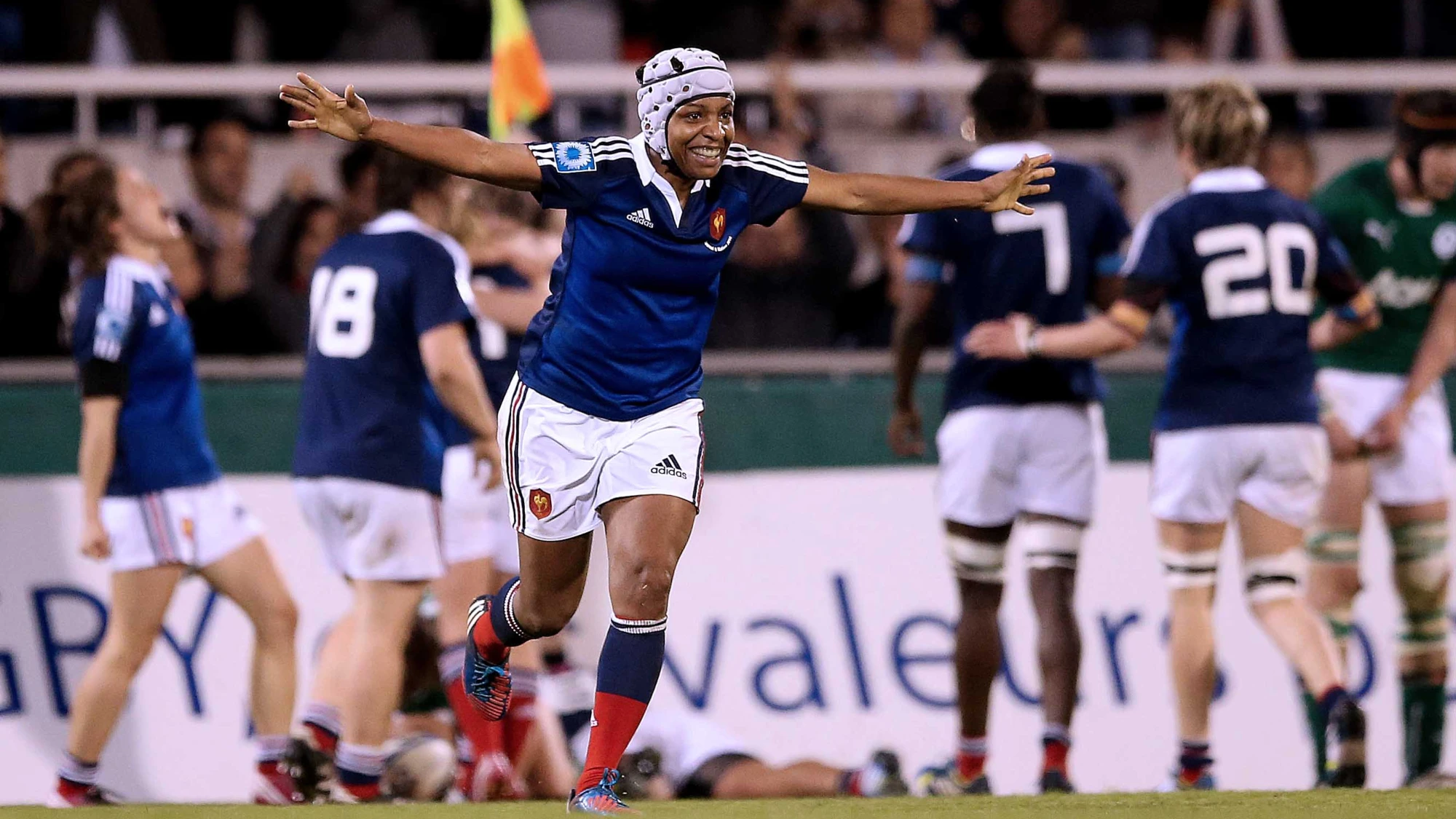It was in the Netherlands of all places that Sandrine Agricole realised that her destiny was to play rugby for France.
From a family in the Paris suburbs where football and athletics were king, Agricole fell in love with the oval ball.
By 1998 she was playing club rugby at Villiers-sur-Marne on the outskirts of the French capital and on an end-of-season trip to Amsterdam, she got to see Les Bleues in person for the first time. From that moment on, she had just one goal in her mind.
She explains: “We were in Holland for our end-of-year trip and it happened to coincide with the Women’s World Cup. It wasn’t an exotic trip but I found out there that there was a France women’s rugby team and I will always remember during the anthems I was looking at the French team and I said to one of my teammates, ‘one day I’ll be out there with them’. It’s from there that the desire to play to the highest level came and that willingness to make the sacrifices necessary to reach that goal.”
FALLING INTO RUGBY
As Agricole explains it, she fell in love with rugby from the moment she discovered the sport.
“Like Obélix (from the Astérix comics), I was dropped in it and it was love at first sight. Our teacher believed in freedom for the players with the ball and that’s what attracted me to the sport, you would be given a ball and you could run with it, you could kick it and if you didn’t have it, you could catch the person with the ball and tackle them to the floor. I loved that freedom.”
By 2003 she had caught the eye enough to earn a spot in the France team, winning the first of her 84 caps against England at Twickenham.
It was a chastening experience, beaten 57-0 by an all-conquering England side who would go onto win the Grand Slam.
BACK-TO-BACK
But by the following year France had completely turned things around, clinching the first of Agricole’s three Grand Slams with a 13-12 win over England.
Agricole recalls: “My first cap came against England at Twickenham, it’s a game I will never forget, not because we won, on the contrary we were thrashed 57-0. But because it was the first game. I wore the No.21 and I discovered the highest level. It was the start of a beautiful journey in blue until 2014.
“Twickenham was big but I didn’t have any idea of it as the home of rugby or what England or Le Crunch was. For me it was just the aim of representing my country, of singing La Marseillaise, of being on the other side for the hymns and wearing the blue jersey.
“We won the Grand Slam the following year. There had been a World Cup in 2002 and a big turnover of players and the coaching staff. In 2003 there were a lot of new players with a new game plan and while we didn’t win the Championship (France finished third), we showed there was potential, and we fulfilled it in 2004. We won back-to-back Grand Slams and it showed the potential that there was on the women’s side. Women’s rugby was starting to find a place. I wouldn’t say the doors were wide open, the media didn’t follow us much at the time, but they started to hear about us, in particular thanks to our results.”
MOVING TO TEN
After that success, England took control of the Championship, winning seven consecutive titles before Grand Slams for Ireland in 2013 and then France the following year.
That was Agricole’s final year at Test level and a landmark one for the sport with France hosting the World Cup later in the year.
Having spent all her international career in the centre, Agricole moved to fly-half in 2012, a turning point for her.
She said: “It was recognition of the work that I had done because for me, moving from centre to ten showed that I had gained in maturity and that there was faith in me to manage the team. The role of fly-half is very important, involves taking a step back, being relaxed and concentrated and it corresponded with the maturity that I had gained over the years. In 2012 I must have been 32 and that’s what you ask of players of that age.
“Between 2003 and 2010, people were aware of the France women’s team because the results were pretty good, but that was it. It was from 2014, when we won the Grand Slam and then started preparing for the World Cup in France, that things changed.
“The media started covering us more, the journalists followed individual players and people realised that rugby played by women wasn’t a power game, it wasn’t just this idea of lorry drivers, it was young women who were studying, some of whom were mothers, and it told the story of people making sacrifices and all the work they put in alongside it. We got a good result at that World Cup. Of course our goal was to win, but that third place and the fact we had won over the public, that allowed women’s rugby to gain the media coverage that it has today. The Six Nations is shown live on TV, our summer tour of North America was shown live, we are now part of the sporting landscape.”
POST-PLAYING
In some ways it is a shame for Agricole that her retirement coincided with rugby’s rise in popularity, but she was able to stay close to the game.
Having done some work for the FFR, she decided that her future lay as a physio, doing her studies alongside the final three years of her international career – a decision which she credits with helping her avoid the post-retirement struggles that affect many sportspeople.
She said: “The idea was to close one book and open another. I wanted to close the page on rugby, and once I had closed that book, I could move onto a new professional life. It worked well because it all tied in and helped me avoid that period that affects a lot of sportspeople who stop their careers and ask themselves questions and aren’t sure what they are.
“I was able to move on and not fall into any sort of depression, it was all planned out.”
Agricole worked initially in Rennes, also having an experience with Vannes in Pro D2. She then got an opportunity with the FFR, working initially with the France Under-18s Women’s Sevens team, culminating in a trip to the Youth Olympics in Argentina.
Annick Hayraud, the manager of the French women’s team then offered her the chance to work with them, which she did so including on the summer tour in 2019.
And in 2020, a new opportunity came up, with French heavyweights Toulon, where she is now one of two physios at the club.
She said: “I’d already had some experience with Vannes and later I met a great osteopath, Jean-Pierre Darnaud, who became a friend and said I was made for the highest level. Toulon were changing physios and he spoke to the sporting director who was a friend. I met (sporting director) Laurent Emmanuelli and then (manager) Patrice Collazo and the feeling was great. They showed their faith in me and I hope they haven’t been disappointed, I don’t think they have.”



